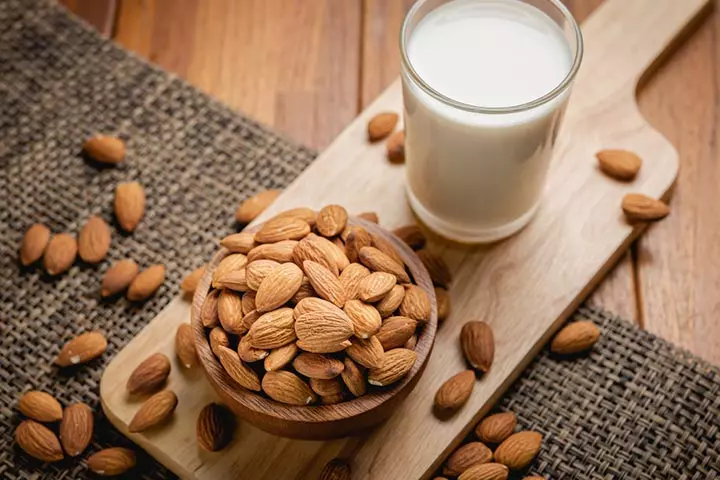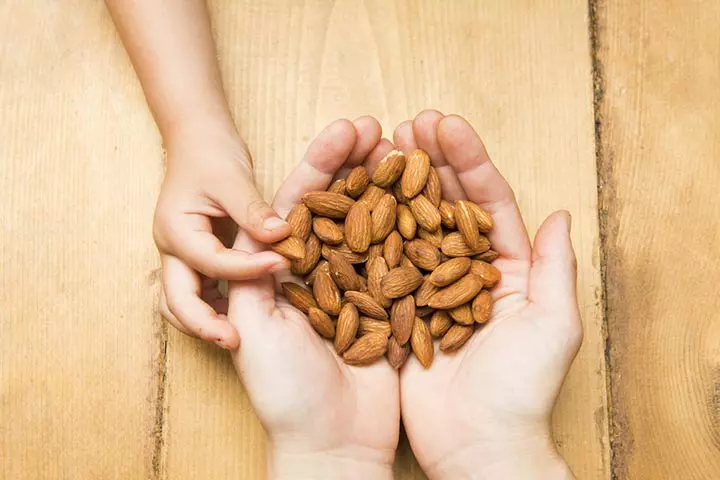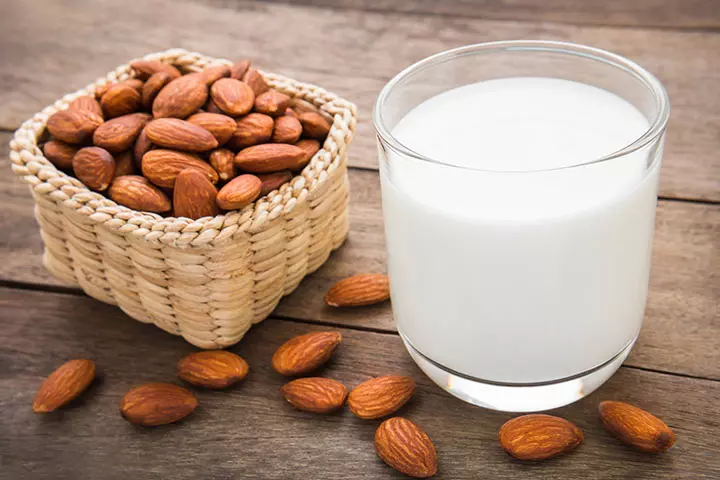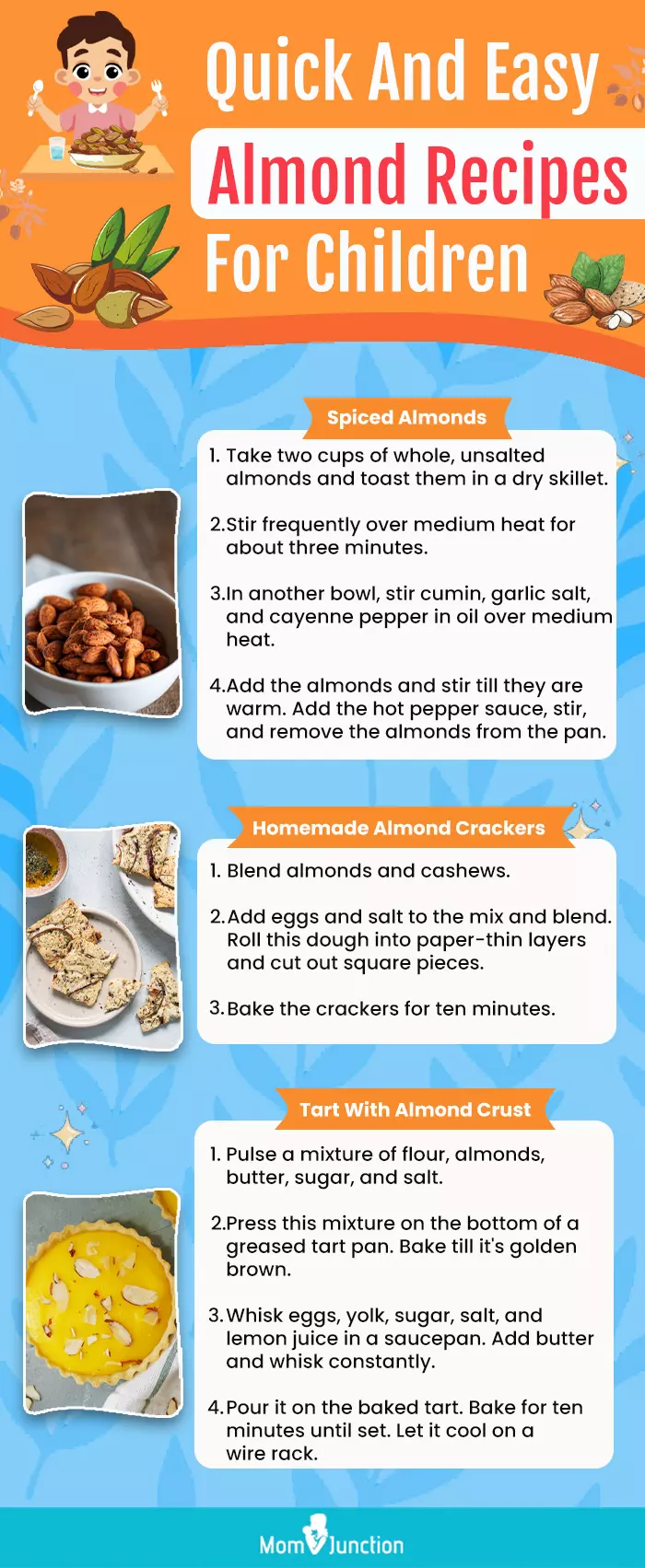
Almonds for kids are one of the healthiest snack options as they are delicious and packed with nutritious benefits. Dry fruits are rich in minerals, vitamins, fiber, and protein content, and are good snack alternatives to junk food. Almonds rank the best among dry fruits conferring health benefits such as brain development, enhanced energy, accurate blood pressure, and more.
So if your children keep asking you for something to munch on, try some healthy almond recipes or even the dry fruit on its own. Read on as we elaborate on almonds, and discuss their benefits and side effects.
Almond Milk
Image: Shutterstock
It’s a kind of plant milk extracted from almonds. It has a creamy texture and a nutty flavor. Just like the nuts, the milk does not contain any cholesterol along with lactoseiA sugar commonly found in milk and other dairy products . Thus, people who are allergic to dairy products can easily have this milk and this list of people also includes the vegans. Commercial almond milk is available in the market in various forms such as:
- Sweet
- Unsweetened
- Vanilla
- Chocolate
- Plain
This variety of milk is slowly pushing the ever popular soya milk to the 2nd spot regarding consumption. The nutritional content of this variety of milk is less than that of cow milk, but the commercial versions have a high percentage of vitamins. A comparative study will help you understand this facet. One cup of almond milk has only 1 gram of protein and 2 mgs of calcium while one cup of cow’s milk has 8 grams of protein and 300 mgs of calcium (1).
 Quick fact
Quick factNutritional Value Of Almonds
Researchers at the University of Florida Institute of Food and Agricultural Sciences. have found that moderate intake of almonds every day enrich the diets of kids.
Alyssa Burns, a researcher who was part of the study says: “Almonds are a good source of plant protein — essential omega-3 fatty acids, vitamin E and magnesium.”
Almonds are a healthy food because of the high vitamin, protein, and mineral content, and almost zero cholesterol, which prevents coronary cardiac diseases and strokes. Almonds are an incredible source of vitamin E. It helps maintain the skin, cure skin related problems, and act as an antioxidantiSubstances that may prevent or slow down cell damage caused by harmful molecules called free radicals that is soluble in lipids. They also have high vitamin B complex levels, which helps in the proper functioning of the enzymes. They have a huge amount of minerals like manganese, potassium, calcium, iron, magnesium, zinc, and selenium. We have given an in-depth analysis of what 100 gram of almonds possesses as nutritional value: (2)
Principle Nutrient Value:
- Energy 575 Kcal
- Carbohydrates 21.67 g
- Protein 21.22 g
- Total Fat 49.42 g
- Cholesterol 0 mg
- Dietary Fiber 12.20 g
Vitamins:
- Folates 50 µg
- Niacin 3.385 mg
- Pantothenic acid 0.47 mg
- Pyridoxine 0.143 mg
- Riboflavin 1.014 mg
- Thiamin 0.211 mg
- Vitamin A 1 IU
- Vitamin C 0 mg
- Vitamin E 26 mg
Electrolytes:
- Sodium 1 mg
- Potassium 705 mg
Minerals:
- Calcium 264 mg
- Copper 0.996 mg
- Iron 3.72 mg
- Magnesium 268 mg
- Manganese 2.285 mg
- Phosphorus 484 mg
- Selenium 2.5 µg
- Zinc 3.08 mg
Phyto-nutrients:
- Carotene-ß 1 µg
- Crypto-xanthin-ß 0 µg
- Lutein-zeaxanthin 1 µg
Types Of Almonds
Image: Shutterstock
There are two different varieties of almonds, and you should have a proper idea about them:
1. Sweet Almonds:
These are the ones which are so famous for their health benefits and are widely consumed all over the world.
2. Bitter almonds:
Also known as wild almonds, bitter almonds should be avoided, because of an amygdaliniA naturally occurring compound found in plant sources such as fruits and nuts presence.
Benefits Of Almonds For Kids
Here are some of the health benefits for which you kids need to intake almonds:
1. Promotes Strong Bones:
- One of the key elements to strengthen your child’s bones and improve its longevity is Phosphorous. As almonds contain a high percentage of phosphorus, it can help your kid attain stronger bones and teeth.
- It also protects them from the risk of unwanted tooth decay and osteoporosisiA condition that weakens bones, increasing the chance of sudden, unsuspected bone fractures in future.
2. Boosts Immune System:
- The immunity factor in the kids is imperative to prevent them from getting sick, ensuring proper growth.
- The alkali metals present in almonds help to increase immunity. They also have antioxidant actions which help to prevent any disease.
- Almonds also have a high content of Vitamin E. Various researches conducted in the past has shown that people who have a high content of Vitamin E in their diets have about 30-40% lesser chance of suffering from coronary cardiac diseases.
3. Prevents Cancer:
- The intake of almonds boosts the passage of food through the colon, and this is why the chances of colon cancer gets decreased. The sole reason behind this is the high fiber content in almonds.
4. Healthy Brain Development:
- Riboflavin and L-Carnitine help the proper development of the brain of your kid and almonds contain both these nutrients in high quantities.
- It helps to keep your kid’s nervous system in the proper state and prevents Alzheimer’s diseaseiA degenerative brain condition leading to loss of memory and thinking and behavioral problems .
5. Boosts Energy Level:
- Almonds are rich sources of manganese, copper and Riboflavin and they maintain the metabolism rate properly thus producing energy.
- Your restless young kids and the ones who sweat out at their workplaces or gymnasiums should include almonds in their diets for a good energy boost.
6. Treats Constipation:
Image: Shutterstock
- The high fiber content in the almonds helps to prevent constipation in the growing kids. This problem is quite common among children and almonds help them a lot.
7. Overcomes Dermatological Problems:
- If your kid has dry skin or other such skin related problems, almonds can your help him overcome the symptoms significantly.
- The doctors advise almond oils for the newborn babies for bone development and healthy skin. It also helps in maintaining proper skin complexion.
8. Maintains Optimum Body Weight:
- One of the grave issues that kids today face is weight related issues.
- You should make sure that their diet consists of unsweetened almond milk.
- The unsaturated fats present in the milk maintain proper appetite of the kids, and they don’t end up overeating.
9. Heart Health:
- The unsaturated fats again play a great role in the maintenance of a healthy heart along with the proteins and potassium present in almonds.
- Magnesium prevents kids from heart attacks in their future. Folic acid safeguards the deposition of surplus fat in the inner walls of the arteries and thus they can work properly.
10. Maintains Blood Pressure:
- Sodium and potassium content in almonds are quite high, and this helps to retain the blood pressure and prevent fluctuations.
Side Effects Of Almonds For Kids
Although almonds have many benefits, some of the side effects, which you should also know about:
1. Allergy:
- Some people have nut allergies, and they can have rashes in their bodies along with breathing problems after having almonds.
2. Poisoning:
- Consumption of a few bitter almonds can be deadly for an individual.
3. Kidney Stones:
- Studies conclude that about 75% people suffering from kidney stones have calcium oxalate in their urine. Almonds have huge content of oxalates, and thus, people suffering from kidney stones should take in high quantity.
Facts And Information On Almonds For Kids
- Almond is the crunchiest dry fruit, which can quench thirst easily.
- Due to its long storage life, you can store almonds for two years.
- Almonds serve as one of the best cholesterol regulators.
- As almonds contain 90% of unsaturated fats, consumption of the dry fruit can never make your kid obese.
- Almond flour is the very healthy ingredient that you can use for gluten-free baking purposes.
- People often call Almonds as ‘Brain Food’ for kids.
 Research finds
Research finds- Due to the high percentage of flavonoids in almonds, it can nourish the skin effectively.
- Almonds protect a child from diabetes and cardiovascular diseases.
Almond Recipes For Kids
1. Homemade Almond Milk:
Image: Shutterstock
You Will Need:
- 225gm almonds
- 1-liter water
How To:
- Soak the almonds in water and refrigerate it for about four hours. You can also soak it for overnight.
- Remove the outer skin of the almonds, as after soaking they would come off easily. If you have already purchased the blanched almonds, you can skip this step.
- Blend the almonds along with the fresh water in a food processor.
- Press the mixture through the metal strainer, using a spatula or hard spoon so you can obtain smooth almond milk.
- You can feed this homemade almond milk for kids now.
Sharing her recipe for making almond milk at home, a mother of two, Meg says, “I make almond milk every week, one with vanilla extract and one with real vanilla beans. Why two? Well, Todd and I like the flavor that the real vanilla beans impart in the milk and the kids don’t care for the black flecks of the vanilla bean. They are both rich and creamy and completely satisfy my urge for regular milk (i).”
2. Almond Cookies:
Image: Shutterstock
You Will Need:
- ½ cup Almond meal
- 2/3 cup Plain flour
- 2 Tbsp. Corn Flour
- 1/3 cup powdered sugar
- A pinch of salt
- ½ tsp. Baking Powder
- 1/3 cup Butter
How To:
- Sift the corn flour, plain flour, baking powder and salt in a large bowl and keep it aside.
- Beat the sugar and butter using a hand blender until they turn fluffy. Add the almond meal to the sifted flour mixture and try to make a soft dough.
- Wrap the dough in a plastic paper and refrigerate.
- After a few minutes, take the dough out and roll it to 1/2″ thickness.
- Use a cookie cutter to obtain the perfect shapes. Also, place an almond on top of every cookie.
- Bake the cookies in the oven at 170 degrees Celsius for 20-22 minutes. This is a perfect addition to school lunches.
 Quick tip
Quick tipReplace plain flour with powdered oats and sugar with jaggery powder to make almond cookies tastier and healthier.
Does your kid enjoy eating almonds? Tell us about it here.
1. At what age can children eat almonds?
You can introduce whole nuts and dry fruits for kids, such as almonds, after six years of age to avoid the risk of choking. Alternatively, you may introduce nuts in paste or powdered form from the age of six months (3).
2. How many almonds should children eat a day?
You can give your child around 30g of almonds per day to ensure they reap its nutritional benefits (3).
How do almonds compare to other popular snack options for children, such as chips or candy?
Almonds are a healthier snack choice than chips or candy. They offer vital nutrients such as healthy fats, protein, and fiber, while chips and candy are often packed with unhealthy fats, sugar, and empty calories. Nevertheless, it’s crucial to practice portion control for a balanced diet (6).
What are some common misconceptions about giving almonds to children?
Common misconceptions regarding giving almonds to children include worries about choking hazards, allergies, fat content, and calorie density. Ensure safe consumption and consider individual circumstances for optimal results (3) (6) (7).
Are there any unique health benefits of almonds for children with special needs or developmental disorders?
Although almonds are nutritious for children, they do not provide specific health advantages exclusively for children with special needs or developmental disorders. Nevertheless, the nutrients in almonds promote overall well-being and brain development. It is crucial to seek personalized dietary advice from a healthcare expert.
Can almonds help improve a child’s gut health and digestion?
Almonds can enhance a child’s gut health and digestion. They possess plant sterols, which reduce cholesterol absorption, unsaturated fats that enhance lipid profiles, and phytonutrients that support beneficial gut microbes. Additionally, they can assist in weight management by inducing satiety and fullness (8).
Almond for kids is a nutritious dry fruit rich in vital nutrients such as vitamins, protein, fiber, and health-promoting antioxidants. It can be used to prepare almond milk which children can consume as a main beverage occasionally. You can feed a handful of almonds to your child in chopped or powdered form (flour). Alternatively, you can add almonds to different foods, such as porridge, pancakes, shakes, and smoothies, to intensify a meal’s nutritional value. So make this healthy food a part of your child’s well-balanced diet. It can be a healthy addition to both non-vegetarian and vegetarian diets.
Infographic: Simple And Delicious Almond Recipes For Children
Almonds are not only delicious but also versatile. Their delicate nutty flavor pairs well with different fruits. You can add them to various recipes and make meals more nutritious and delicious. This infographic shows some simple snack recipes using almonds. Your children will definitely love these easy-to-make energy-boosting snacks.
Illustration: Momjunction Design Team
Key Pointers
- Almonds are a healthy snack rich in essential fatty acids, magnesium, vitamin E, and fiber.
- Almonds can be given to children in various forms such as almond butter, almond milk, or whole roasted almonds.
- They contribute to brain development, boost immunity, and help maintain bone and cardiac health.
- Almond milk is a good substitute for milk as it is free from cholesterol and lactose.
- Almonds have a huge amount of oxalate and hence are not recommended for children with kidney stones.
- Some children may have an allergic reaction to almonds and hence are advised to consume them with care.
Illustration: Almonds For Kids: Benefits Side Effects And Recipes
Image: Stable Diffusion/MomJunction Design Team
Personal Experience: Source
![]()










